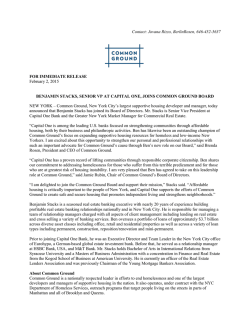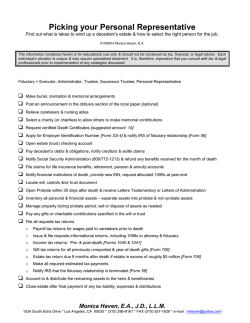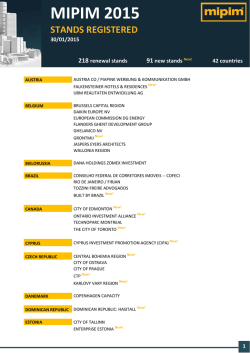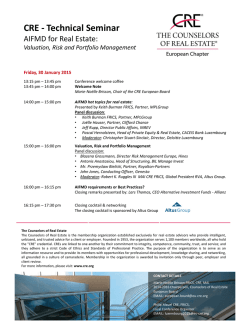
RERI 2015 RFP - Real Estate Research Institute
RERI Sponsors Sustaining Sponsor 2015 Request for Research Proposals Real Estate Research Institute Pension Real Estate Association Up to $20,000 available to fund real estate research Sponsors Proposal submission deadline: February 2, 2015 AEW Capital Management, LP The Real Estate Research Institute (RERI) seeks proposals for funding of research to be undertaken in 2015. RERI is a non-profit organization created to stimulate high-quality research on real estate as an asset class, real estate investment performance and market fundamentals that will elevate the quality of real estate investment decision making. Through its research funding, RERI also aims to encourage and support developing real estate researchers among junior faculty and graduate students. Altus Group Axiometrics, Inc. CBRE Econometrics Advisors Clarion Partners Cornerstone Real Estate Advisers, LLC CoStar Group Deutsche Asset & Wealth Management Green Street Advisors Heitman Henderson Global Investors (North America) Inc. International Council of Shopping Centers (ICSC) Invesco Real Estate IPD (Investment Property Databank) LaSalle Investment Management Morgan Stanley National Association of Real Estate Investment Trusts® (NAREIT) National Council of Real Estate Investment Fiduciaries (NCREIF) National Investment Center for the Senior Housing & Care Industry (NIC) National Multi Housing Council (NMHC) Property & Portfolio Research Prudential Real Estate Investors RCLCO Real Capital Analytics SNL Financial LC TIAA-CREF Asset Management Trepp, LLC UBS Global Asset Management USAA Real Estate Company Xceligent Deadline for receipt of proposal to RERI: February 2, 2015 Midnight EST Proposals and information requests should be e-mailed to: [email protected] The Real Estate Research Institute 100 Pearl Street, 13th Floor Hartford, CT 06103 USA Telephone: (860) 692-6341 Dissertations, post-dissertation research and research proposals by non-tenured faculty are welcome and will receive special consideration. Projects involving researchers from different disciplines also are welcome. However, only one proposal per research team may be submitted. Projects that will be jointly undertaken by academic researchers and industry professionals are strongly encouraged. Projects by industry practitioners, including those seeking mentorship without funds, are also encouraged. Proposals may involve research that is underway, but not substantially completed, at the time of application. With the exceptions of university and college settings and academic conferences, partial or completed research cannot be presented to any organization prior to presentation at the RERI Conference. Completed projects must include a non-technical, two-page executive summary that synopsizes the research thesis, results and implications for investors with limited use of mathematics. Research projects that are funded and successfully completed will be eligible for presentation at the annual RERI Research Conference. 2015 Research Priorities Major themes underlying research projects that RERI seeks to fund to help understand implications for real estate pricing, risk-adjusted performance and investment strategy include the following: * Risk * Globalization of Capital Flows * Demographic Shifts * Technology * Sustainability Specific topics that RERI views as priorities include, but are not limited to, the following: Real Estate as an Asset Class Changing nature of institutional mixed asset portfolios and the role of real estate; the expanding definition of the “real estate bucket” (self-storage, student housing, parking, etc.); emerging portfolio innovations and trends including mortgage debt as part of the real estate allocation, combining public and private allocations, international diversification, the shift from defined benefit to defined contribution (where does private real estate fit?) Performance Measurement and Portfolio Risk Analytics Property valuation, macro-economic linkages vs. local drivers; private vs. public real estate pricing dynamics; asset and portfolio risk, cross-sectional and temporal; innovations in benchmarking core and non-core funds; issues (new and old) with appraisal-based return indices; risk adjusted performance of Global cities and major Gateway markets versus other (primary, secondary, tertiary); impacts of “Green” and Sustainability (LEED, Energy Star, GRESB) Real Estate Equity Investment: Private and Public Long-run performance vs. other asset classes; investment fees and costs, risk measures and analysis, corporate governance, inflation hedging, relative liquidity; Future performance of real estate in the face of major demographic shifts and globalization; accessing international markets via private or public (REITs, real estate securities) vehicles Real Estate Capital Markets: Domestic and Global Flows, Liquidity, Pricing and Risk Volume and investor composition; financing and ownership structures; risk analysis and impact on asset pricing and investment returns; liquidity and liquidity risk measurement; Growth of sovereign wealth funds (SWFs) and globalization of capital market flows - diversification, tax transparency, pricing, size and liquidity of markets Property Market Fundamentals Impact of socio-demographic and/or technological changes on demand for space (type, function and location) and obsolescence of property; densification of office use, e-commerce implications for retail and industrial, etc., market restructuring and globalization, firm location and geographic dynamics; walkability and transit-oriented development Commercial Mortgage Debt and Commercial Mortgage Backed Securities (CMBS) Mortgage debt as part of institutional real estate portfolios – tactical opportunity or here to stay? Senior debt, enhanced and mezzanine lending - investment characteristics, performance and benchmarking. CMBS is back securities structure, pricing, risk, performance, and market evolution… implications for private real estate markets Research Proposal Requirements Specifications Funding Schedule !!MARK YOUR CALENDARS!! THE 24th ANNUAL RERI RESEARCH CONFERENCE WILL BE HELD April 29-30, 2015 DePaul University Chicago, IL Details to Follow Research Proposal Requirements In an effort to support private market real estate research, RERI may be able to assist in acquiring data from major third-party real estate data providers; a list of data providers is available on the RERI website, www.reri.org. Researchers proposing to use data that are neither in hand nor readily available are advised to include in their proposals detailed descriptions of the data sources, costs and timelines for acquisition. Note that funding may be reduced by the cost of data acquisition if RERI is able to source the same data as proposed for the project . Submission requirements: (a) The proposal should not exceed six pages in length, doubled spaced, including references and attachments (but excluding resumes). (b) Only one proposal per researcher or team of researchers may be submitted. (c) Only e-mailed proposals will be accepted. (d) The deadline for receipt of proposals is midnight EST February 2, 2015. Proposals submitted after the deadline will not be considered, nor will faxed or mailed hardcopy proposals. To facilitate processing, applicants should structure the proposal in accordance with the section outline shown below: Cover Page: Project title, name of researcher(s), organizational affiliation(s), contact details for each researcher (including daytime telephone number and email address), and a one-paragraph abstract of the proposal. Section 1. Well-defined research objective stating the question or issue to be investigated. Section 2. Concise description of methodology. Complex proposals may benefit from a diagram or flow chart presentation of the methodology, as well as a narrative description. Section 3. (a) Description of principal data sets and availability. (This is a major factor in successful proposals.) (b) Plan for procuring third-party data in a timely manner, if the research will be relying on thirdparty data. Section 4. Research project timetable. Section 5. Estimated total cost of the project along with any proposed data costs. Note: RERI grants are intended to be used for faculty research/summer support. RERI will not pay university overhead costs, costs of purchasing equipment, or conference travel expenses. Required Attachment. A one-page resume for each of the principal researchers, showing experience and understanding of the research topic as evidenced by selective references to previous work experience, presentations and/or publications. Review Procedures Proposals are reviewed by the Proposal Review Committee of the RERI Board of Directors and Advisory Board. See the RERI website’s (www.reri.org) Research section for guidelines for the RERI Proposal Review Process. The Proposal Review Committee recommends to the Institute’s Board of Directors the research proposals that it believes RERI should fund for 2015. Following approval by the Board, one or more members of the Board or Advisory Board are assigned as “mentors” to each research project. Funding Schedule Funding of up to $20,000 is available for approved projects. The Board, however, reserves the right to fund larger amounts for projects that are exceptionally timely and unusually costly. Most projects will receive funding in the $10,000 to $15,000 range. RERI also encourages researchers seeking funding in excess of normal grant amounts for “large-scale” or “multi year” projects that clearly meet RERI’s research mission. Funding schedule is: 50% upon acceptance of the proposal and 50% upon completion of the research to the satisfaction of the RERI Board of Directors. Such satisfaction includes: (1) a substantive draft produced by September 18, 2016, and (2) presentation of the research by the lead researcher(s) at the 2016 RERI Conference, upon invitation. Researchers funded by RERI may, at the Board’s discretion, be invited to a roundtable discussion and/or to present results at the annual RERI Research Conference in 2016. Reasonable travel costs (up to $1,000) will be covered by RERI and should not be included in the proposed project budget. Board of Directors Robert Smedley, Chairman Emeritus Jim Clayton, Ph.D. Cornerstone Real Estate Advisers - President Paige Mueller, RCLCO Real Estate Advisors -Secretary/Treasurer Michael Acton, AEW Capital Management, L.P. Susanne Ethridge Cannon, DePaul University Dean Gatzlaff, Florida State University Jeff Havsy, NCREIF Greg MacKinnon, Pension Real Estate Association Mauricio Rodriguez, Texas Christian University Elaine Worzala, College of Charleston Advisory Board Brent Ambrose, Ph.D. The Pennsylvania State University Matthew Anderson, Trepp LLC Timothy Bellman, Invesco Real Estate Shaun A. Bond, University of Cincinnati Peter C. Burley, REALTORS University Dennis Capozza, University of Michigan Tony Ciochetti, University of Texas at San Antonio Douglas Curry, Xceligent, Inc. Yongheng Deng, National University of Singapore Mark Eppli, Marquette University Simon Fairchild, IPD c/o MSCI Jeffrey Fisher, Homer Hoyt Institute Andrew Florance, CoStar Group, Inc. Michael Gately, Cornerstone Real Estate Advisers Michael Grupe, National Association of Real Estate Investment Trusts (NAREIT) Jun Han, TIAA-CREF Charles Harry, Jr., National Investment Center for the Senior Housing & Care Industry William Hughes, UBS Global Asset Management Real Estate Ron Johnsey, Axiometrics Indraneel Karlekar, Principal Real Estate Investors James Kelleher, Argus Research Company Keven Lindemann, SNL Financial LC David Ling, University of Florida Crocker Liu, Cornell University Mary Ludgin, Heitman David Lynn, Cole Real Estate Investments William Maher, LaSalle Investment Management Andrew McCulloch, Green Street Advisors Will McIntosh, USAA Real Estate Company Paul Mouchakkaa, Morgan Stanley Michael Niemira, ICSC, Inc. Mark Obrinsky, National Multi Housing Council Joseph Pagliari, Jr. University of Chicago, Booth School of Business Ruijue Peng, Property & Portfolio Research, Inc. Martha Peyton, TIAA-CREF/Financial Services Edward F. Pierzak, Ph.D., TIAA-CREF/Financial Services Douglas Poutasse, Bentall Kennedy Timothy Riddiough, University of Madison-Wisconsin Mark Roberts, RREEF Robert Ruggles, Altus Group James Shilling, DePaul University David Shulman, Baruch College, CUNY Jon Southard, CBRE Econometric Advisors Tim Wang, Clarion Partners Robert M. White, Jr., Real Capital Analytics Abdullah Yavas, University of Wisconsin-Madison 2015 Research Timetable February 2, 2015 Deadline for receipt of proposals to RERI. E-mailed proposals received after midnight EST February 2, 2015 will not be accepted. April 29, 2015 Research Grant Committee recommendations submitted to the RERI Board for approval. Appointment of “mentors.” Funded research proposals announced at the annual RERI Research Conference. Notifications of acceptance/rejection mailed. September 18, 2015 Interim results/update due. Mentors review progress to date. January 26, 2016 Deadline for final research papers and executive summaries due to RERI. February 2016 Final review of 2014 projects and selection of papers to be presented at the annual RERI Research Conference. Spring 2016 Presentation of invited 2015 papers at the annual RERI Research Conference. 2015 Dissertation Grants The Real Estate Research Institute also issues several dissertation awards of up to $5,000 for support of dissertations that relate to the Research Priorities topics listed previously. Dissertation proposals should follow the same guidelines listed under Research Proposal Requirements. In addition, dissertation proposals must include the vita of the dissertation supervisor(s) and a letter from the dissertation chairperson stating that the dissertation proposal has been accepted by the student’s dissertation committee. Dissertation proposals must be received by February 2, 2015. Dissertation should be completed by January 26, 2016 for possible inclusion of a paper based on the dissertation in the Spring 2016 seminar. Funding will be granted 50% upon acceptance of the proposal and 50% upon the completion of the dissertation to the satisfaction of the student’s dissertation committee. The recipient will provide a copy of the completed dissertation to RERI after its acceptance by the student’s dissertation committee. 2014 Research Awards Can Competition Improve Credit Ratings? Evidence from the CMBS Market Authors: Sean J. Flynn, Andra C. Ghent The Credit Availability Component of Commercial Real Estate Prices Author: Jonathan A. Wiley The Impact of Cross-border Real Estate Investment on Commercial Real Estate Capitalisation Rates Authors: Anupam Nanda, Pat McCallister Fundamental Drivers of Dependence in Real Estate Returns Author: Eva Steiner, Jamie Alcock The Economic Foundations of Regional Real Estate Markets Authors: Marc W. Simpson An Information-based Pricing Factor in International Commercial Real Estate Markets Author: Roland Fuess, Daniel Ruf Impact of Large Investors in Distressed Housing Markets Authors: Abdullah Yavas, Ronald Rutherford, Jessica Rutherford, Marc “Tim” Allen Capital Structure Matters: Leverage Effects on REIT Return Performance Authors: Andy Naranjo, Emanuela Giacomini, David Ling Default Risk of Securitized Commercial Mortgages: Do Smart Growth Property Features Matter? Authors: Xudong An, Gary Pivo Contact Information Specifications About RERI 2015 Request for Research Proposals Real Estate Research Institute About the Institute The Real Estate Research Institute (RERI) is a non-profit organization that was incorporated in 1987 to stimulate high quality research on real estate investment performance and market fundamentals. Since its founding, RERI has provided funding for over 150 research papers and has helped create a body of scholarly research on topics that are timely and of interest to institutional real estate investors. RERI is supported by an extensive sponsor base of industry associations, real estate investment advisory firms, and industry research firms. Governance is provided by a Board and Advisory Board made up of leaders from both the industry and academic communities. RERI’s mission is to encourage and reward research on real estate as an investment and as an asset class that is both academically rigorous and of value to the institutional real estate investment profession. In addition, RERI serves to provide a forum through which the real estate academic, professional, and regulatory communities can interact, facilitating the exchange of insights amongst these stakeholders. Administrative functions of the Institute are housed at the Pension Real Estate Association (PREA) www.prea.org Proposals and information requests should be e-mailed to: E-mail: [email protected] Deadline for receipt of proposal to RERI: February 2, 2015 Midnight EST Proposals and information requests should be e-mailed to: [email protected] The Real Estate Research Institute 100 Pearl Street, 13th Floor Hartford, CT 06103 USA Telephone: (860) 692-6341 The Real Estate Research Institute 100 Pearl Street, 13th Floor Hartford, CT 06103 USA Telephone: (860) 692-6341 Fax: (860) 692-6351
© Copyright 2026




